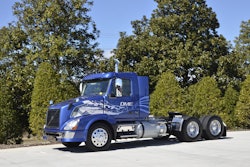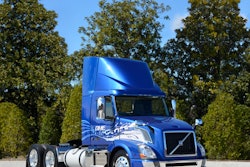The role of advanced diesel technology and biodiesel as energy efficient technology and a renewable energy source will be highlighted on June 12 at the 16th annual Congressional Renewable Energy & Energy Efficiency EXPO + Forum on Capitol Hill.
The Diesel Technology Forum (DTF) will join other energy businesses, sustainable energy industry trade associations, government agencies, and energy policy research organizations in exhibiting at the EXPO. In addition, Ezra Finkin, DTF’s Director of Policy and External Relations, will be one of the speakers at a forum focusing on biofuels.
The Sustainable Energy Coalition - in cooperation with Members of the U.S. House of Representatives and U.S. Senate Renewable Energy & Energy Efficiency Caucuses, and in partnership with the Sustainable Energy and Environment Coalition, Congressional Energy Savings Performance Contract Caucus, High Performance Building Caucus, Green Schools Caucus, and Hydrogen & Fuel Cell Caucus – is hosting the EXPO.
A live webcast will be streamed from 9:30 a.m. to 4:30 p.m. EST on Wednesday.
Clean Diesel’s Major Role in the Energy Efficient Future
The DTF exhibit and Ezra Finkin’s presentation will include information about the major advancements in clean diesel technology, ultra-low sulfur diesel fuel and biodiesel in significantly reducing emissions and improving fuel efficiency.
Finkin will address a number of key issues about why diesel will play a major role in the energy efficient future of the U.S. and worldwide including:
Diesel’s Inherent Fuel Efficiency
- Diesel fuel has the highest energy density of any transportation fuel
- Diesel’s power is confirmed by the broad application of diesel in heavy duty applications: construction, mining, agriculture, goods movement and people movement.
- National Petroleum Council and the UN’s International Energy Association: Diesel will remain the powertrain of choice in heavy duty applications given the energy density of fuels and the inherent efficiency of the powertrain.
- Growing acceptance in U.S. automobile market of diesel powered cars and light trucks due to fuel economy that makes diesel cars 20 to 40% more fuel efficient than gasoline.
Diesel’s Transition to “Clean Diesel”
- Availability of ultra low sulfur diesel fuel (15 ppm) in 2006 to 2007 allowed for the introduction of advanced engine and after-treatment technologies.
- 2007 and 2010 EPA emissions standards have resulted in new clean diesel trucks with near-zero emissions and have reduced NOx and PM emissions by 98% compared to 1988 diesel trucks
- Tier 4 diesel applications are being phased in for off-road engines
Diesel is Part of our Sustainable Future
- Bio-based diesel has the capability of reducing greenhouse gas content of fuel and can achieve a 60% greenhouse gas reduction
- Increasing supply and availability with many of the feedstocks used to produce high quality biodiesel are byproducts of other industries such as soybean oil and cotton seed oil.
- Increase use of biodiesel as many heavy duty applications can operate on a blend of up to 20% (B20) and many light duty vehicles can operate on a blend of up to 5% (B5).
Diesel in the Future
- Diesel is proof that efficiency, clean and sustainability can go together.
- Europe has one of the strictest carbon reduction requirements for its light duty vehicle fleets and manufacturers have met this requirement in part due to the efficiency of the diesel powertrain and its reduced CO2 attributes.
The 16th annual Congressional Renewable Energy & Energy Efficiency EXPO + Forum
This year’s EXPO expects to bring together more than 50 businesses, sustainable energy industry trade associations, government agencies, and energy policy research organizations to showcase the status and near-term potential of the cross-section of renewable energy (biofuels/biomass, geothermal, solar, water, wind) and energy efficiency technologies. The morning program will feature Members of the U.S. Congress and throughout the day speakers will discuss - in person and via live webcast - the role sustainable energy technologies can play in meeting America’s energy needs.
As Congress, the Administration, the business community, environmental advocates, and American voters search for options to stimulate the economy and “green jobs,” as well as address issues of national security, higher energy costs, increased reliance on energy imports, and the environmental threats associated with energy consumption, the EXPO will help address the role that sustainable energy technologies might play.
This will include not only the technical aspects of renewable energy and energy-efficient technologies but also related issues such as economics, jobs potential, environmental benefits, current and near-term market potential, model programs in the public and private sectors, and institutional, financial and legal barriers.
Some of the featured speakers include:
- Beth Craig, Director, U.S. EPA's Climate Protection Partnership Division Craig O'Connor, Director, Office of Renewable Energy & Environmental Exports, U.S. Import-Export Bank
- John Norris, Commissioner, Federal Energy Regulatory Commission
- Kathy Ahsing, Director of Planning, U.S. Army Energy Initiatives Task Force
- Dr. David T. Danielson, Assistant Secretary for EE/RE, U.S. Department of Energy
- U.S. Representative Chris Van Hollen, D-MD
- U.S. Representative David G. Reichert, R-WA
- U.S. Representative Paul Tonko, D-NY
- U.S. Representative Tony Cardenas, D-CA



















